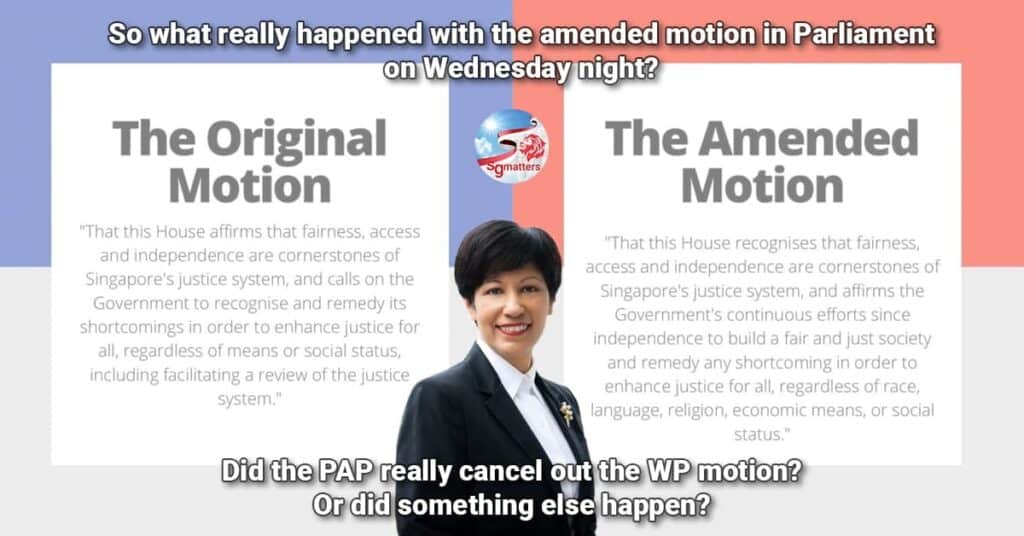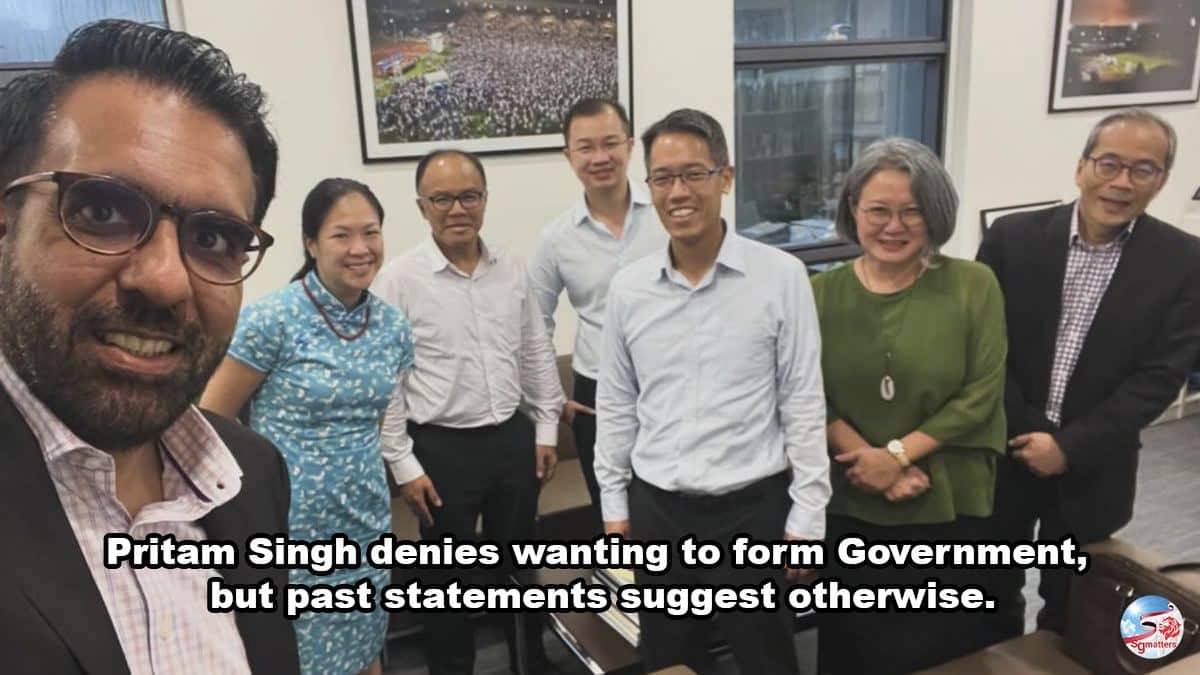So what really happened with the amended motion in Parliament on Wednesday night?
Did the PAP really cancel out the WP motion? Or did something else happen?
Here’s how it went.
WP filed a motion on our justice system. See the blue infographic.

The original motion had 4 main aspects:
- An affirmation of values that underpin our justice system.
- A call to the government to recognise and remedy “its” shortcomings. It is not clear what “its” was referring to. It could mean the system as a whole is defective. Or it could mean government shortcomings which have somehow made the system defective.
- A call to enhance justice for all, regardless of means or social status.
- A call for a review of the justice system, which on the face of it suggests the entire system needs a review. This would be necessary if the system as a whole is defective.
However as the debate progressed, it became clear that there was a bipartisan consensus that our system is not broken, has served Singapore well, and is improving. But as with any system, it can be further improved.
As Ms Sylvia Lim herself said in her speech: “By filing this motion, the Workers Party are not saying the system is broken or ineffective but it can be improved… Today’s motion is not about tearing down the system …..Far from it. It is about a desire to raise the system to the next level.”
Indeed there was a lot of common ground between the PAP and WP MPs in the debate.
Both agreed on the fundamental values that underpinned our system – fairness, access and independence.
Both sides noted the steps taken by the government and the progress over the years.
The debate was really about what we can do to make the system even better, with suggestions from both opposition and PAP MPs.
As the debate drew to a close, it became clear that many of the suggestions put forward by WP are already under active review by the government. For example, regarding the call to enhance access to justice, Minister Shanmugam said the government is reviewing the possibility of a Public Defenders Office.
Other suggestions could not be so easily implemented due to high costs and potential downsides.
For suggestions that the government disagreed with, the PAP Ministers took pains to explain why this was so.
It was a positive and altogether constructive debate, and many on my side of the aisle appreciated the contributions of Ms Lim and her colleagues as much as we did those of PAP backbenchers.
After all the speeches were delivered (except for mine, and Ms Lim’s rounding up speech) it was evident that a wide-ranging root and branch review of the justice system was not necessary.
As such, Mr Murali Pillai proposed a few amendments to the motion, to better reflect the actual course and substance of the debate. See the red infographic. Surely this was a more constructive course of action than simply rejecting the WP’s motion altogether.
Mr Murali offered his amendments in the spirit of wanting to establish common ground with the opposition and hoped for bipartisan support of the amended motion.

Were the WP MPs given a chance to debate the amendments? Yes, they were.
Speaker invited all MPs to speak on the amendment.
None of the opposition MPs did so.
Even after the motion was amended, as it was not clear if Ms Sylvia Lim had wanted to speak on the amendment, I held back delivering my speech and requested Mr Speaker to first clarify with Ms Lim if she had wanted to speak on the amendment. Ms Lim stated that she only wanted to speak to close the debate.
Were the opposition MPs able to consider the amendments? Yes, they were.
They agreed to some amendments but not to others.
Speaker went through the proposed amendments line by line:
On the first amendment, which simply replaces “affirms” with “recognises” and is not a substantive change, opposition MPs did not object;
On the second amendment, which “affirms the government’s continuous efforts since independence to build a fair and just society” they voted no, notwithstanding their agreement that we have a good system that it is not broken;
On the third amendment, which affirms the government’s continuous efforts to remedy any shortcomings, they voted no.
This was puzzling and sad.
This amendment was to reflect the fact that the system is not defective as a whole but can be improved. Mr Murali was certainly not saying that there were no shortcomings, as he stood up to clarify. On the contrary, by including the words “any shortcomings” the amendment expressly recognizes that there are indeed shortcomings and these must be remedied, as we have remedied other shortcomings over the years.
But the amended motion also seeks to be fair and acknowledges that the government has over the years continuously tried to improve the system. But the opposition MPs would not acknowledge this;
On the fourth amendment, “to enhance justice for all regardless of race, language, religion and economic means” (in addition to social status proposed in the original motion), the opposition MPs did not object;
On the fifth amendment which removes the call for a review of the justice system (since the debate showed that many of the suggestions put forward are already being reviewed and there is no need for a complete overhaul of the system), the opposition MPs voted no.
The amendments moved by Mr Murali were to more accurately reflect the actual debate in the House and to establish common ground with the Opposition. He earnestly called for bipartisan support. But that was not to be.
The government will nevertheless continue in our efforts to improve our system and enhance justice for all.
Videos of the relevant parts of the debate are below:
https://www.facebook.com/IndraneeRajah/posts/4199499330067004
[irp posts=”625″ name=”The show goes on”]





